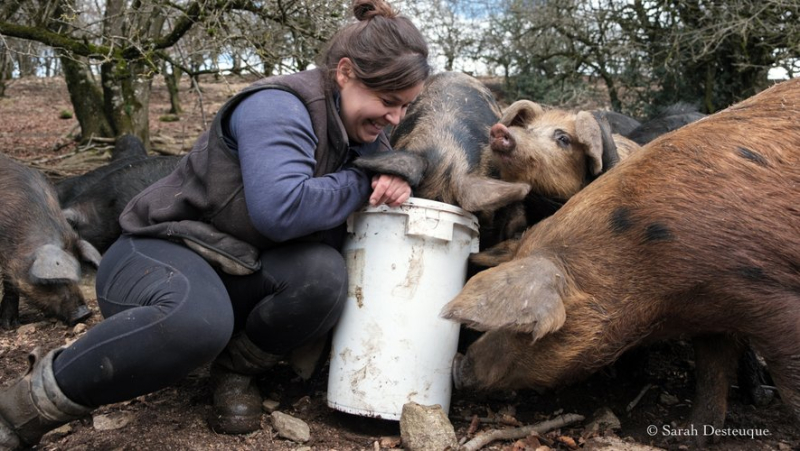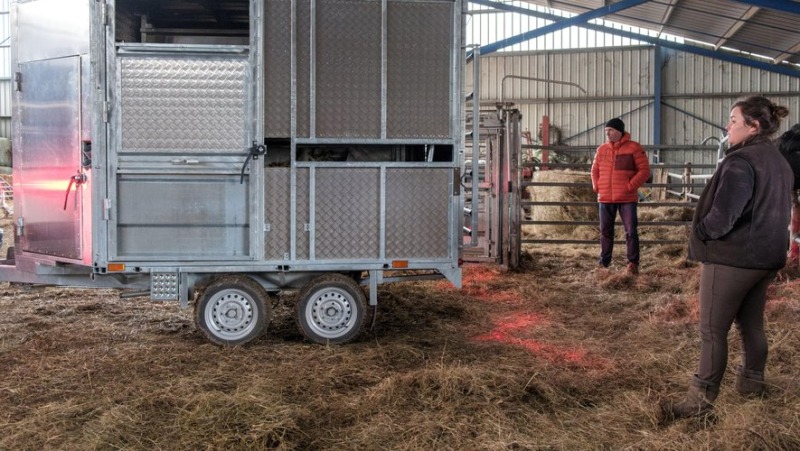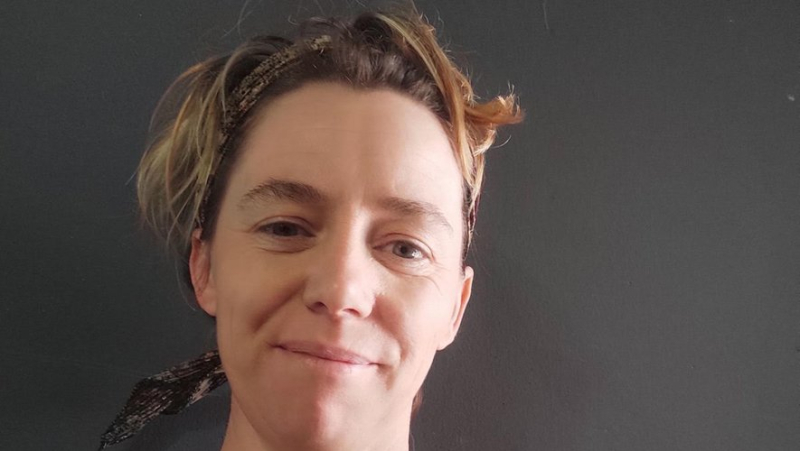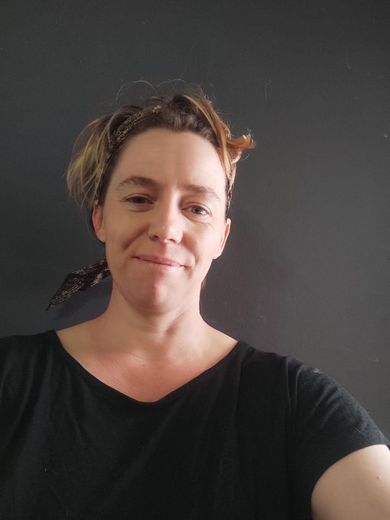Marion Welch, cattle and pig breeder in Fraïsse-sur-Agoût, in the Béziers hinterland, is experimenting with the Abat’Mobile

Marion Welch raises 130 cattle and 250 pigs in Fraïsse-sur-Agoût. Sarah Desteuque – ML

L'Abat'Mobile a testé l'abattage pour la première fois le 2 juillet dernier. Sarah Desteuque – ML


Emilie Dequiedt AJ – ML
Une quarantaine d’éleveurs de l’arrière-pays biterrois se sont regroupés pour fabriquer et expérimenter un caisson d’abattage à domicile nommé Abat’Mobile.
We all remember the demonstrations by farmers last January, who denounced falling incomes, empty treasuries, banks that do not keep up, different environmental standards in Europe, from one country to another. another, the cost of living which continues to increase… In short, a dismay, often invisible, which has pushed winegrowers, breeders, cereal growers, market gardeners… to shout their anger through snail operations on the highway and other actions of discontent. Yes, the “working poor” are also our farmers. So how can you make a decent living from your work as a peasant today ? Is this possible without being the heir to land and agricultural tools ?
Some have succeeded. How ? Most often by multiplying and/or pooling solutions, by diversifying. If many open shelters, like the breeders of La Couvertoirade, other initiatives exist. As in Fraïsse-sur-Agoût, with cattle and pig breeder Marion Welch. She is one of around forty organic breeders from the north of Hérault who have together built a “Abat’Mobile”, a slaughter box.  ;
On July 2, the Abat’Mobile, a home slaughter box (going from farm to farm) built and tested by around forty breeders from the north of Hérault, sent his first animal in the afterlife. The meeting was set by the Abat’Mobile 34 association, chaired by Émilie Dequiedt, from the agricultural group for joint exploitation (Gaec) “La part du loup”, in Avène (which raises sheep and makes cheese), on the farm of Pierre Bodot and Sophie Rambaud, breeders in La Couvertoirade, in Caylar. A calf was to be slaughtered there.
A first successful test
"This was a test to find out if the box was working, to see if any adjustments needed to be made, and to observe how the animals behave", explained Émilie and Basile Dequiedt. More tests are coming.
On July 9, it will be the turn of Marion Welch, cattle breeder – cows and oxen – and pigs – rustic black pork from Corsica, Gascon and other regions in Fraïsse-sur-Agoût, in the Béziers hinterland. She will put one of her 130 oxen through the tests.
A farmer since 2009 in extensive cattle breeding in pastoralism, on peat moors, she moved to Gaec (named Les Hautes Landes) with her father at a place called La Sagne, in 2016 Today, Marion Welch is preparing to set up a limited liability agricultural operation (EARL). She also raises 250 pigs outdoors on 15 hectares.
Food: “by-products” to save money
"Concerning the diet of my cows, as they graze, I only need very few supplements. On the other hand, for my pigs, it’s not the same ", specifies Marion Welch. 250 pigs, that's mouths to feed.
The breeder continues: "Organic outdoor pig farming is very difficult economically, notes Marion Welch. You should know that the 2023 price for basic food is 650 € per ton. Me, I need a ton every three days…hellip; You can imagine that economically, this is not viable."
Thus, the breeder found a solution: the recovery or purchase of “by-products” biological. First of all, she recovers seed sorting waste from organic cereal growers of Scic Graines Equitaires, of which she is a member and co-manager. Marion Welch also buys “co-products” at the Bio Sud factory in Arles (rice flour, rice bran, green rice and rice scraps). "I also collect spent grains (residue) from the Bows artisanal distillery, in Laure-Minervois, in Aude."
Share the slaughter
The idea of the Abat’Mobile was born around 2018. It all started with the Egalim law which pursues several objectives: among others, that of remunerating producers fairly, for their allow them to live with dignity from their work. "It allowed the creation of a regulatory framework to set up experimental projects", explains the breeder. She continues: "You should know that breeders from Biterrois bring the animals to the slaughterhouse in Pézenas or neighboring departments. There are no other solutions. For me, from Fraïsse, it’s a two-hour drive, with cattle that are not used to being transported and locked up. Then there is the one-night wait before slaughter. We had to change all that, first of all for animal welfare, but also for us. Because the time that we do not spend preparing the animals, on the road and at the slaughterhouse, is time saved to do something else."
Hence the idea, as with the mobile bottling units for winegrowers, of a home slaughter box for all members. "Around forty breeders – cattle, goats, sheep and pigs – , the vast majority in organic are participating in this adventure, under the aegis of the Abat’Mobile 34 association. The project was set up in partnership with the national institute of agricultural research (Inrae ), and the Pézeans slaughterhouse. It was necessary to design a tool that complies with European regulations. For this, we were supported by various organizations, including the peasant confederation, the Region, the Fondation de France, European funds, and by Hamelle creation, in Lodève for the creation of the box."
A participatory prize pool, with compensation, was launched on the Internet, which helped them in all their studies and procedures, as well as in financing the fund. The association has entered into an agreement with a working breeder, Xavier Tonnabel, who will take care of the slaughter, helped by the breeder using the box. The project is currently at the experimental stage.
The choice of Gaec and direct sales for Émilie and Basile Dequiedt
Before 2015, Émilie Dequiedt and her husband Basile, settled since 2007 at a place called Les Planes, in Avène, in a joint farming group (Gaec), La Part du loup, did not milked their 200 sheep only to sell their milk to Lactalis.
"We had chosen this type of corporate arrangement firstly because it allowed each of us to have a status, so as not to be "the wife of" or "the husband of". To also pool the equipment (mowers, balers, forage plate…), very expensive equipment. Finally, the Gaec also allowed us to easily bring in partners who could participate in the work or enter the capital as farmers. We are still in Gaec and everything works."
On the other hand, the couple was unable to make a living from selling their milk to the large dairy group. "It’was very difficult. So, we decided to stop and only do direct sales. With the help of the Region, the Department and Civam Bio (for the conversion to organic), we managed, in 2015, to set up and finance our processing laboratory for the manufacture of our cheeses and our ice creams. "
Today, Émilie and Basile Dequiedt do not regret their choices.
I subscribe to read more




